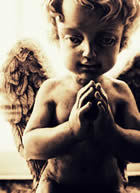
“I want to thank God for the things we have and things we don’t have,” my daughter began at dinner one night. My husband and I looked at each other, intrigued. Lately our 5-year-old had begun to improvise grace before meals. The result had yielded a cross between Zen blessings and Dorothy Day Catholic-Worker prayers.
“What are the things we don’t have?” I asked Charlotte when she finished her prayer that night.
“Guns,” she said, without hesitation.
Though children’s prayers are often sentimentalized, with Precious Moments figurines of fair-haired children with bowed heads, our daughter has shown us that they are much more complex. Listening to Charlotte at dinner each night has reminded me that prayers, like dreams, are not always predictable. They are a way of processing the unexpected daily cacophony of events and questions, of static and silence.
Chocolate and townhouses
Children’s prayers aren’t just for the child praying. They inspire reflection and conversation in the adults (and other children) who are listening. It reminds me of the daily Examen, or prayerful self-inventory that I have learned at the Jesuit high school where I teach. According to Saint Ignatius’ “Examen of Consciousness,” we are asked to meditate on events in the previous day or the one upcoming. We begin by offering gratitude and appreciation for things as small as the taste of jam on toast (I substitute coffee or chocolate) or large as the safe return of soldiers from Iraq.
The most crucial part of the Examen is when we reflect on moments when our hearts were divided, when we wavered between helping someone or taking a moment for ourselves.
Listening to Charlotte is a kind of Examen. She compliments God frequently, sometimes with antique phrasing — “For you are the nicest” — and thanks Him for “furniture, food and townhouses.” But she also asks Him to provide shelter and food for the poor.
Frequently her prayers remind me of Scripture, such as when Matthew says, “Therefore I tell you, do not be anxious about your life, what you shall eat or what you shall drink, nor about your body, what you shall put on it. Is not life more than food and the body more than clothing?”
One of the hardest parts of hearing Charlotte’s prayers, though, is the knowledge that some day she will learn about evil in our world, about true inequality and suffering. My heart feels divided. I want to protect her, but I know her prayers are also a preparation for me as a parent to talk about challenging subjects. Certainly her mention of guns signals that she already has intimations of evil.
Not all children are taught to pray — even some people of faith consider it an act of excessive inculcation for the young. Biologist and atheist author Richard Dawkins goes even further and claims that the practice is abusive, a pre-emption of the child’s own right to think and choose freely.
But not introducing children to prayer can curtail an enduring conversation.
Thanksgiving
Children’s prayers don’t have to be confined to the dinner table or Mass. One of Charlotte’s favorite books is The Circle of Days by Reeve Lindbergh. A vibrant adaptation of Saint Francis of Assisi’s prayer “The Canticle of the Sun,” this book blends practical thanksgiving with forceful images and contemplation. The collective speakers thank God “For sister water, clear and chaste/Useful, humble, good to taste” and on the next page “For fire, our brother, strong and bright,/Whose joy illuminates the night.”
I appreciate the fundamental purity of the book, the frank acknowledgment of positive and destructive impulses in everything around us. I wonder if Charlotte gets this, too; not long ago she correctly used the word “serene” from the book.
Some of my daughter’s most creative and surprising moments come during her prayers. They are also a way to gauge new influences in her life. One night last fall, shortly after she began public preschool, she was asking God to guard us from scary things (“like thunderstorms”) when suddenly she switched gears and said, “and to the republic for which he stands, indiv-is-i-ble . . .”
Before Charlotte, my husband and I rarely prayed at dinner. Now we wonder how we managed without it. Charlotte’s prayers are wise and funny, a reminder of how to pray without guile or agenda. She is deciphering something for us, and whenever she ends her nightly blessing it is a moment or two before I am able to reach for my fork.
Carolyn Alessio teaches at Cristo Rey Jesuit High School in Chicago. Her articles have appeared in the Chicago Tribune, the Chronicle of Higher Education and the 2003 anthology The Pushcart Prize XXVII: Best of the Small Presses.
Photo: